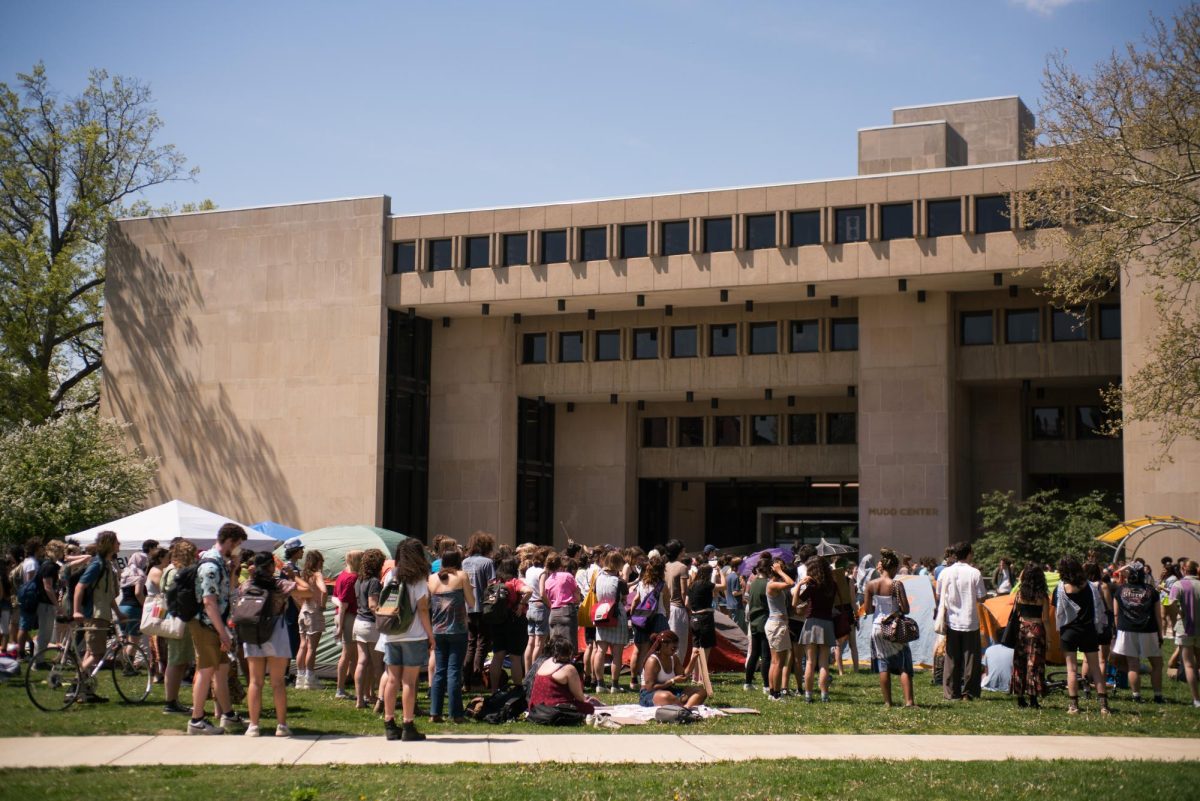As I sat down for dinner last week, I saw a text from my dad. “Tulkarem now from our cousins’ house,” it read. It was accompanied by a picture of the night sky in my grandfather’s hometown, a plume of smoke rising from the skyline. Then, a video of a crowded street. Sirens broke through the screams as the cameraman approached a collapsed building. A fire burned without an apparent source. Across the road, a limp body hung from mangled steel beams, protruding from the concrete that once enclosed a cafe. I winced. “Family is ok,” the next message said. That news carried little relief. The family of the nameless man suspended in the rafters would get none. Why should I?
In the 52 weeks since the Oct. 7 attacks, life has changed dramatically for millions of people. Countless masses lay dead, and even more have had their lives turned upside down by displacement, sickness, injury, and the loss of loved ones. To speak of normalcy in a period like this seems ridiculous. But life goes on in other corners of the world. I imagine my daily routine is not too different from that of my family in Palestine and Lebanon. I wake up, shower, and make coffee. I go to work, read, write, and study. The only difference is that my actions are not punctuated by the sounds of dropping bombs. My house has no chance of being struck by a drone and turned to rubble. I do not live life on a razor’s edge.
In the U.S., the greatest challenge I have had to face is trying to convince others to care about Palestinian suffering. In the first few months after October of last year, I expected this new wave of conflict to be a watershed moment in history. No one, I reasoned, could see or hear of destruction on such a massive scale, conducted in such an unjust way, and be unmoved. I fully believed in the inevitability of a perspective shift in politically engaged places like Oberlin.
Then summer came and went, and I was off campus for three months. On Aug. 14, Oberlin’s Board of Trustees released their decision not to divest from companies materially supporting Israel’s occupation of the Palestinian territories. In their reasoning, they cited the integrity of “critical thinking, discourse and debate” about Israel–Palestine on our school’s campus. A few weeks earlier, Israel had bombed five schools in Gaza in a 10-day period, killing a combined 179 people. The irony is almost tangible.
In September, Oberlin’s administration proposed clarified guidelines for campus protests, which included restrictions on demonstrations that interfere with academic or work environments. That is to say, any protest that does its job — by disrupting the normal flow of life to refocus attention on a more pressing reality — would potentially violate these new procedures.
It looks like I was wrong: The watershed moment I expected never came. Passions rose, then they fell, and things have essentially returned to normal. Conversations about Israel–Palestine remain, of course. People still hold strong opinions and have spirited debates, but those play out in the same way they always have. We have not learned from Oct. 7 or the year of death and destruction that followed it. The College’s administration has done everything in its power to avoid addressing the subject head-on. Administrative messaging has consistently focused on the importance of maintaining community and civil discourse at a time of deep ideological divides. In theory, I applaud that commitment to fostering safe and inclusive spaces. At the same time, I can’t help but feel that by ignoring the realities of how devastating the past year has been, that messaging has come across as completely inadequate. It represents a total lack of meaningful change in how our community interacts with and discusses the Israeli–Palestinian conflict.
To make any genuine progress, we have to overhaul how we as an institution and as a community talk about Israel–Palestine. It is not enough to treat this as a conflict that can be discussed in good faith between those who disagree on whether or not Palestinians deserve human rights. The past year must be taken as a reminder of that. We would not, and should not, accept debates about the legitimacy of Apartheid South Africa in which both sides’ viewpoints are given equal gravity and respect. Certainly, Jewish-Israeli and Palestinian views must be incorporated into discussions and held as equally valid. But holding space for diverse experiences and opinions is not equivalent to embracing rhetoric that legitimates genocidal violence and systemic racism or blatantly denies that they are being carried out.
A year of near-total apathy comes across as so much more egregious when it is contrasted with students’ and activists’ unending calls for action. In spite of our pleading, the U.S. has not suspended its weapons shipments to Israel. Furthermore, a ceasefire has not been achieved, and a broader war has not been averted. And, as always, Palestinians remain disposable in places like Oberlin, where our and our families’ lives are the subject of good-natured, healthy debate.
A year later, Oct. 7 may as well have been the end of history. That day is rightfully discussed as one of unspeakable tragedy. Beyond that, though, we can’t agree on whether the year that followed carries any weight at all. Are the lives of Palestinians worth taking action over? Are our rights negotiable? Oberlin has been given the chance to answer those questions and has refused to do so. But even without an answer on their precise importance, it’s clear that these past 12 months haven’t tipped the scales in a new direction. In fact, the silence speaks for itself.












